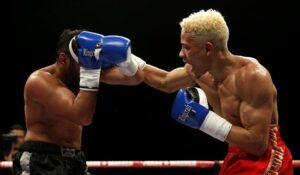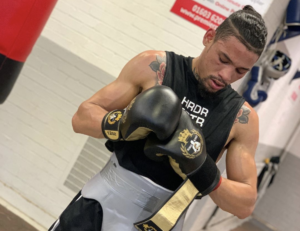A common convention long-held in boxing was that a defeat is the end. Promoters, trainers and fighters went to great lengths to preserve the mighty ‘0’ when, for some, it was a sign that a fighter has not been through and overcome genuine adversity.
Things have eased up a bit in recent years, though, as a number of fighters bounced back even stronger after defeat and common sense eventually prevailed. Lessons can be learned, mistakes can be rectified and fighters can rebuild. This was the task facing Lyon Woodstock (12-2, 5 KOs) after he lost to Zelfa Barrett by decision last May. It was the 26-year-old’s second setback following a loss to Archie Sharp in October 2018.
The build-up to the Sharp fight was a particularly tough one for Woodstock as he was prevented from seeing his daughter, Kiola, for three-months by his former partner. They had split prior to the discovery that a baby was on the way and despite Woodstock’s excitement at the prospect of being a father he was determined not to go back to someone that he described as “manipulative”.

Once Kiola arrived that seed of love that is placed in your heart when you first find out that you are going to be a father flowered and grew immediately, which made it all the harder for him when he was denied access to her a few years down the line.
Losing this fundamental right hit the proud and loving dad harder than any punch ever could, especially when the tech-savvy five-year-old showed that she loved and missed him by managing to put through a FaceTime call through as soon as she got the opportunity. Adults sometimes fall out in life, but being denied to bask in the love of your daughter and shower her with your affection is something that would break anyone’s heart. This denial of the greatest love of all should always be considered in matters of the heart.
However, Woodstock felt that he had regrouped enough in life and in the gym to beat Barrett for the vacant Commonwealth Super featherweight title only to fall short on the night. The new, improved Woodstock was still a work in progress back then — he told me he had reached about “Sixty-percent” of his potential — yet he also maintains that Barrett has done him a favour. Most fighters preface a discussion of a defeat with “I’m not making excuses, but…” yet “The Lion” did not serve up any excuses, just the reasons why he believes he lost to the better man on the night.
“Zelfa did everything great, he was very disciplined, which is where I was lacking in bits, in the moments when you needed to be on the job my mind would wonder and his was on it 24/7,” he told Boxing Social.

One of the main differences I’ve noticed between boxing and, say, kickboxing over the years is that kickboxing gyms are full of preening peacocks who just want to spar and give someone, anyone, a good hiding. Boxing is a lot more collegial, with fighters often telling each other where they can make improvements after a few rounds of going at it. After the defeat, Barrett and his uncle, Pat, told Woodstock, still a potential future rival, what he could do to improve his game.
“They knew I would have a few lapses in that fight and to capitalise on them,” he revealed. “I’ve spoken to them since, they told me that they focussed on the aspect of staying disciplined and sticking to a plan because they knew that was the key. I’d like to have had more time with the positive and new Leon Woodstock before that fight.
“I felt good after the fight at first, there was stuff I did wrong yet stuff I’d failed to do. I thought I’d come to the end of the journey, but I knew there was stuff to work on. I’m not anywhere near where I was before, I’m near the end and just not quite there yet. Losing to Zelfa was a big factor for me. Everything was a lot better than it was after the Archie fight, which hit me quite heavily and started me on my spiritual journey.”
The journey Woodstock speaks of began after the loss to Sharp. His confidence was hit by the reverse then there was a break up with his girlfriend, one of only two he has had in his life. He started to lose interest in himself, and in his physical and mental well-being. His love for the sport that had defined his life thus far also began to wane.
Woodstock is as sharp a dresser as he is a talker yet dependable people around him such as his trainer Ajmal Butt noticed that things were beginning to slide for the young contender. With the help and support of those close to him he eventually decided to tackle his issues head on.

“I felt alone, there was no way out and no one would understand,” admitted Woodstock. “I wasn’t sure who I was, what I was about or whether I was coming and going. My coach is a very serious man, he’d text to see if I was alright, we’d go out for walks and he’d tell me to look after myself. I always knew he cared, but it really stood out for me during that period.
“I had to work on myself first. I stayed away from the gym, ate properly and cut out all the shit I’d been eating. I started to think positively so that my cells would absorb and feed from that positivity. There is no such thing as a good or bad thing that happens to us, things happen and how we respond to them makes it either a positive or a negative thing.
“A lot of people are not present in their life, I was now present in everything and every moment — I started to understand things about myself. Then I got back into the gym. Before all that, even just putting the boxing gloves on made me feel nauseous. I felt I was forcing myself to go back, but doing all that meditating, living in the moment, and listening to the voice in my head brought me back. We don’t listen to our inner voice often enough. It is a really powerful voice that gets lost in the world.

“People know me as this positive, exuberant and confident kid, and I am a lot of the time, yet I realised it was like wearing a cloak and there were times when I had questions and doubts. I never really delved into why I had those things, who I am and stand for, and how things impact on me. I felt I was in a void. I sat directly across myself for those months and started to notice a change to my boxing and the way I was taking in information. I could retain things, work on them, and things started to come together.”
Indeed, the London-born, Leicester-based boxer started to notice immediate changes after he had come to terms with both his first defeat and who he is as a person. The changes did not all come at once — as he said himself the Barrett fight was a step too far too soon — yet he began to think deeply about why he had not always impressed on his way to title contention even when winning fights.
“Watch my fights, I’m always trying to force things, my punches and everything — now I think it will just happen,” he said. “If I have a thought in my head it just happens now. I don’t have to force things. In that first fight after Archie [W 8 over Sergio Gonzalez last March], I put on a totally different performance to the one people I thought I would. I didn’t go in there to rush him: I stuck behind my jab, didn’t rely on aggression and showed a different side of me. That was a big thing for me. I felt great mentally and physically, I was going in the right direction.”

This physical, mental and spiritual turnaround reached its peak in January of this year, the 24th to be precise, when deep meditation and contemplation led to Woodstock’s first dream in years, one that he could also recall in full, vivid detail. It was not over the top or intense, instead he just dreamt about a perfect day: he trained well, spent time with his mother, Zenita, and was visited by his daughter.
It may have been a simple dream, but for Woodstock it is a sign that he has come to terms with his past — his father was abusive to his mother and this was the reason why they relocated to Leicester (he talked to Boxing Social’s Craig Scott about that last March) — his present and his future as a man, father and boxer.
“I was crying when I had that experience but also not crying, if that makes sense? Tears were just streaming down my face. I went deep into a meditation, because it is a slow process that isn’t immediate, it requires patience, and learned that I need to be who I need to be without getting ahead of myself, which is the mistake I make sometimes.
“I’ve asked and answered a lot of questions, some of them I still am searching for the answer for, so I’m not saying I’ll never make a mistake again as life is all about learning. This has been a positive few months for me. I’ve learned the difference between knowing and knowing, understanding and understanding — you can know the words but appreciating them is a totally different thing.”

Throw in the fact that Woodstock has been told he will fight at least four times this year plus that he still has the backing of the man he calls “Uncle” Frank Warren, “The main man in boxing!”, and things could not be better.
“People have different perspectives on simulations, reality, and whether we’ve lived the same life over and again,” he said when looking ahead to showing people Lyon Woodstock Mk. 2. “I am in a position where I understand myself more. I get it. I’ve got a whole new sense of how my positive life will play out in the ring. The way you fight in the ring is a reflection of you as a person and where you are at. You will see more of me in coming fights.
“I feel like a lot has happened without happening. I just want to get into the ring now and show that true reflection of me ring, I am ready for it this time. I’m back out in March and have made adjustments. I’ll have four or five fights this year. A lot of the time I’ve been shaking off ring rust in a fight and that isn’t ideal. The only way to get as sharp as I want to be is by fighting. Ideally, I’ll have a big fight by the end of the year.”
Woodstock also features in the March 12 issue of Boxing News.